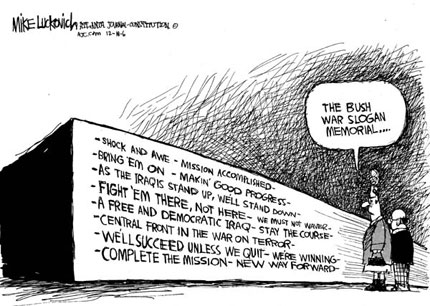Search
Recent comments
- dutiful service....
38 min 54 sec ago - survivor....
43 min 10 sec ago - heat....
2 hours 44 min ago - economic warming....
4 hours 19 min ago - hate-ish....
5 hours 1 min ago - the new mood....
5 hours 27 min ago - devingels....
5 hours 33 min ago - cyprus capers....
7 hours 1 min ago - quack....
7 hours 13 min ago - prepare....
7 hours 19 min ago
Democracy Links
Member's Off-site Blogs
the bushit legacy .....

‘Someday, we will undoubtedly discover that, in the term "surge" - as in the President's "surge" plan (or "new way forward") announced to the nation in January - was the urge to avoid the language (and experience) of the Vietnam era.
As there were to be no "body bags" (or cameras to film them as the dead came home), as there were to be no "body counts" ("We have made a conscious effort not to be a body-count team" was the way the President put it), as there were to be no "quagmires," nor the need to search for that "light at the end of the tunnel," so, surely, there were to be no "escalations."
The escalations of the Vietnam era, which left more than 500,000 American soldiers and vast bases and massive air and naval power in and around Vietnam (Laos, and Cambodia), had been thoroughly discredited. Each intensification in the delivery of troops, or simply in ever-widening bombing campaigns, led only to more misery and death for the Vietnamese and disaster for the U.S. And yet, not surprisingly, the American experience in Iraq - another attempted occupation of a foreign country and culture - has been like a heat-seeking missile heading for the still-burning American memories of Vietnam.
- By John Richardson at 18 Aug 2007 - 7:39pm
- John Richardson's blog
- Login or register to post comments
retreat — the only option
Senior military commanders have told the Government that Britain can achieve "nothing more" in south-east Iraq, and that the 5,500 British troops still deployed there should move towards withdrawal without further delay.
Last month Gordon Brown said after meeting George Bush at Camp David that the decision to hand over security in Basra province – the last of the four held by the British – "will be made on the military advice of our commanders on the ground". He added: "Whatever happens, we will make a full statement to Parliament when it returns [in October]."
Two generals told The Independent on Sunday last week that the military advice given to the Prime Minister was, "We've done what we can in the south [of Iraq]". Commanders want to hand over Basra Palace – where 500 British troops are subjected to up to 60 rocket and mortar strikes a day, and resupply convoys have been described as "nightly suicide missions" – by the end of August. The withdrawal of 500 soldiers has already been announced by the Government. The Army is drawing up plans to "reposture" the 5,000 that will be left at Basra airport, and aims to bring the bulk of them home in the next few months.
Before the invasion in 2003, officers were told that the Army's war aims were to bring stability and democracy to Iraq and to the Middle East as a whole. Those ambitions have been drastically revised, the IoS understands. The priorities now are an orderly withdrawal, with the reputation and capability of the Army "reasonably intact", and for Britain to remain a "credible ally". The final phrase appears to refer to tensions with the US, which has more troops in Iraq than at any other time, including the invasion, as it seeks to impose order in Baghdad and neighbouring provinces.